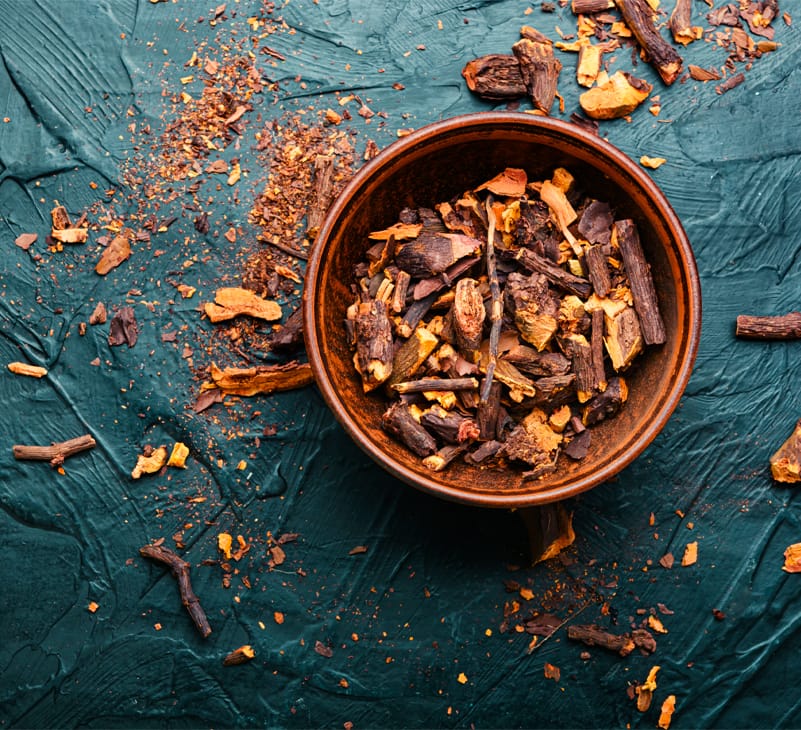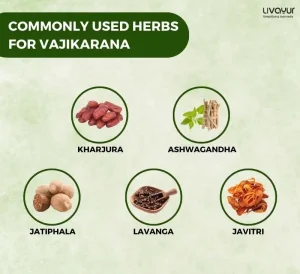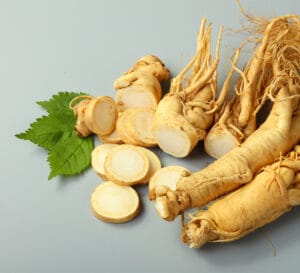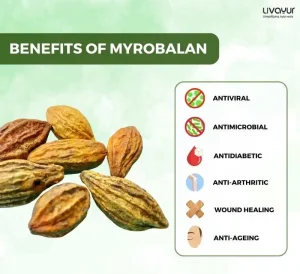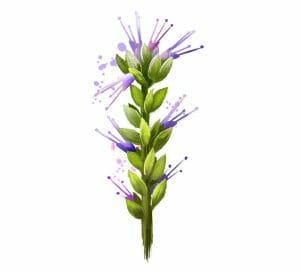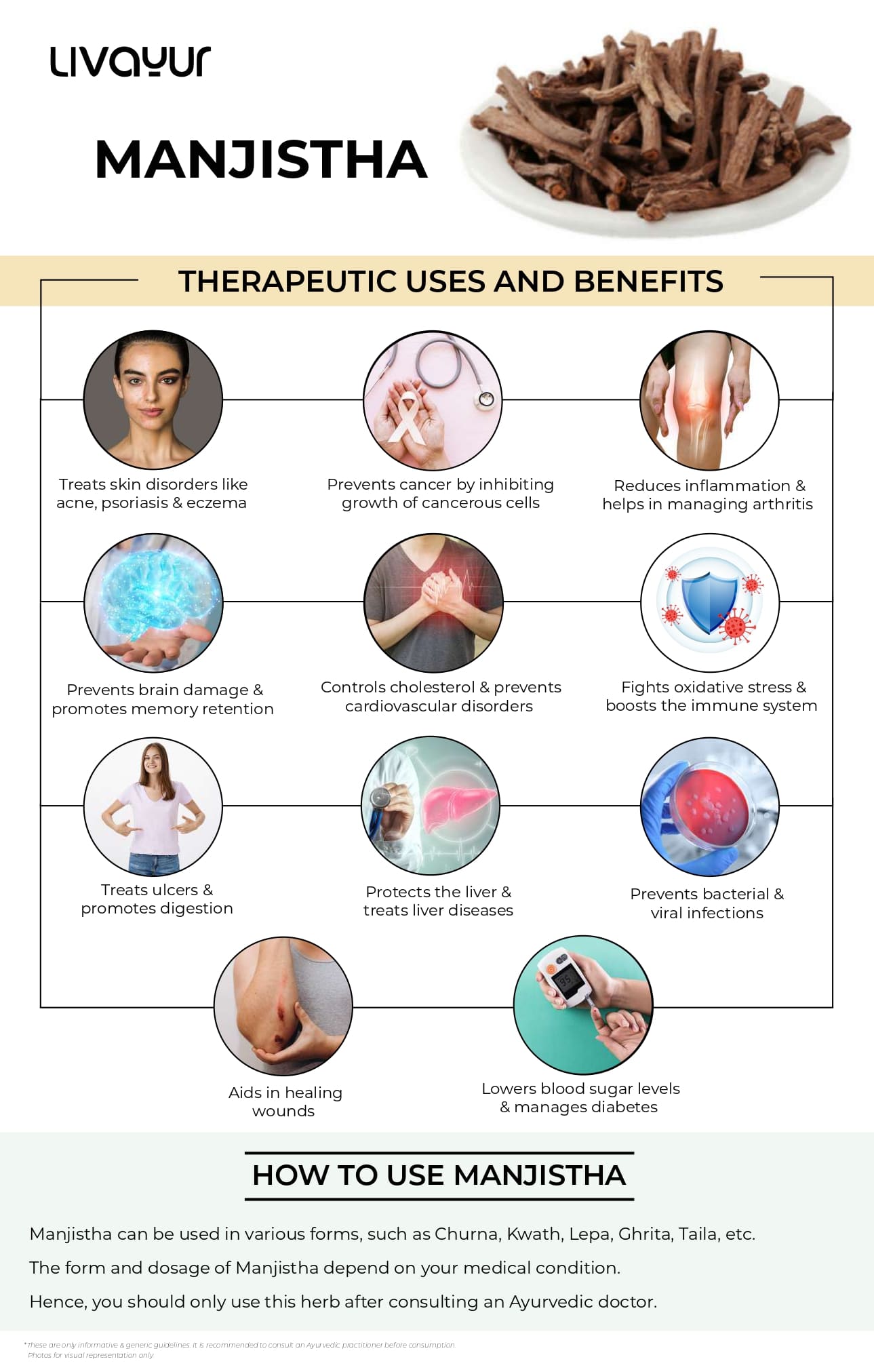
Manjistha or Indian Madder is an Ayurvedic herb known for its blood-purifying and detoxifying properties. Manjistha powder is used in Ayurveda to break down blockages in the blood flow and revive sluggish blood circulation.
Scientifically termed as Rubia cordifolia, this Ayurvedic herb also helps manage several diseases such as skin disorders, liver infections, respiratory disorders, diarrhoea, gastrointestinal problems, diabetes, etc. However, the usage of the Manjistha powder and plant comes with its own set of regulations. Excessive consumption of Manjistha can cause many health problems, and therefore, it is advised to know the usage and side effects of this herb before consuming it.
Ayurvedic Properties of Manjistha
According to Ayurveda, Manjistha has Tikta (bitter), Kashaya (astringent) and Madhura (sweet) Rasa. It demonstrates Guru (heavy) and Rooksha (dry) qualities and is known to have a hot potency or Ushna Virya.
Given these characteristics, the Manjistha plant helps pacify Pitta and Kapha Dosha and slightly aggravate Vata Dosha in the body. Manjistha health benefits are many. It is known as one of the best Pitta pacifiers in Ayurveda, and therefore, is vastly used in the treatment of many skin and eye disorders.
These properties also showcase these effects on the body: Varnya (improvement in skin quality and complexion), Jvara Hara (fever), Dahajit (relief in burning sensation), Vishaghna (blood purification and detoxification), Shotha (inflammation relief) and Raktatisara (treatment of diarrhoea and bleeding).
Common Names Of Manjistha [5]
| Language | Name |
|---|---|
| English | Indian Madder |
| Sanskrit | Aruna, Bhandi, Bhandiralatik |
| Hindi | Manjit, Manjishtha |
| Urdu | Majith |
| Malayalam | Majithi |
Ayurvedic Indications Of Manjistha [1]
Ayurvedic scriptures highlight a range of uses for Manjistha, including:
- Pandu: Treats skin disorders
- Raktadoshahara: Purifies the blood
- Yakrit Vikara: Prevents liver infections
- Sangrahini: Treats diarrhea
- Jvara: Useful in managing fever
- Kamala: Prevents jaundice
- Kasahara: Relieves cough
- Amahara: Treats indigestion
- Dahahara: Alleviates burning sensations
- Shwasha: Eases breathing difficulties
- Deepana: Enhances digestive fire
- Pachana: Aids in digestion
- Rochana: Stimulates appetite
- Kupachan: Prevents bloating and indigestion
Biochemical Components Of Manjistha [1]
This remarkable herb contains a variety of bioactive constituents, including purpurin, munjistin, xanthopurpurin, pseudopurpurin, and glycosides such as rubiadin, rubiprasin A, B, and C. It also features compounds like ruiearbonls, aborane triterpenoids, mangistin, 1-hydroxy 2-methoxy anthraquinone, 3-dimethoxy 2-carboxy anthraquinone, alizarin, garancin, mollugin, and furomollugin.
Health Benefits and Uses of Manjistha
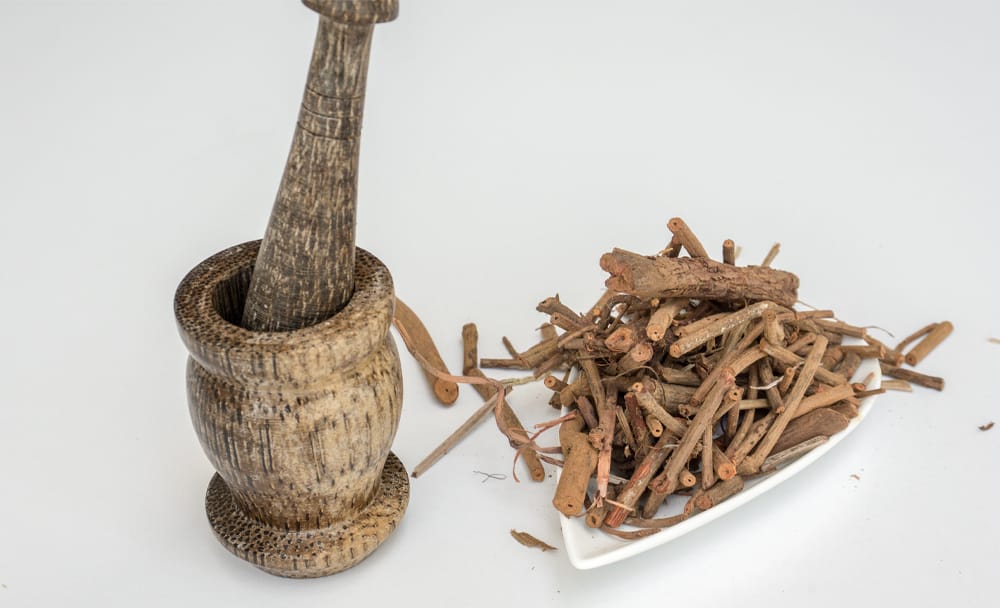
- Cures Diarrhoea:
Manjistha plant is rich in antibacterial and antidiarrheal properties that help remove bacterias from the intestines and treat diarrhoea. Owing to its Deepan and Pachan properties, it also helps make the stool thick and reduce the frequency of motions, further treating diarrhoea and dysentery.
- Treats Respiratory Disorders:
The anti-inflammatory, antibiotic and anti-asthmatic properties of Manjistha help treat several respiratory disorders such as common cold, sore throat, cough, flu, etc. Manjistha also helps ease breathing and remove mucus from the body, thereby treating asthma and many other bronchial conditions.
- Fights Ulcers:
Ayurveda mentions several Manjistha health benefits. It is blessed with potent anti-inflammatory and anti-ulcer properties that help treat many types of ulcers such as ulcerative colitis, peptic ulcer, canker sores or mouth ulcers, etc.
- Supports Weight Loss:
Powered with flavonoids and bioactive compounds, Manjistha powder helps shed the excess weight from the body. It also reduces the levels of LDL or bad cholesterol and improves metabolism to promote weight loss.
- Treats Liver Anomalies:
Manjistha is blessed with hepatoprotective properties that help relieve many liver anomalies, especially jaundice. It is known to detoxify the liver and tune down the liver enzymes to normal levels and improve the functioning of the liver.
- Boosts Menstrual Health:
One of the many Manjistha uses is its ability to manage menstrual health. Manjistha is one of the best Ayurvedic herbs to regulate periods and treat excessive abdominal pain and bleeding during periods. Additionally, it also helps to purify the blood, restore the health of the uterus and regulate hormonal balance in the body, thereby also aiding in the treatment of PCOD.
- Improves Digestion:
Manjistha is known for its digestive properties in Ayurveda. It is rich in anti-flatulent properties that help reduce gas, bloating, constipation, flatulence and abdominal distention. In addition, it is also blessed with antacid properties that help prevent the formation of excessive acid in the stomach and treat indigestion, gastritis, ulcers, etc.
- Treats Kidney Stones:
Manjistha also helps to treat various kidney disorders, including urolithiasis or kidney stones. It also reduces the accumulation of calcium and magnesium in the kidney and ureter and prevents the further formation of kidney stones.
- Promotes Heart Health:
One of the many Manjistha uses is its ability to promote heart health. Powered with cardio-tonic properties, the Manjistha plant helps to treat many heart anomalies. It regulates cardiac rhythm, prevents lipid peroxidation and reduces the risk of several cardiovascular diseases such as atherosclerosis, heart attack, blood clots, etc. It is also known to facilitate blood circulation and control high blood pressure, further boosting heart health.
- Boosts the Functioning of the Lymphatic System:
Manjistha powder helps improve the functioning of the lymphatic system, which is responsible for transporting fluids, providing nourishment and eliminating wastes and toxins from the body. It also helps to boost the immune system and protect the body from various infections.
- Improves Skin Health:
Manjistha uses for skin are many. Blessed with antioxidant, antimicrobial and anti-inflammatory properties, Manjistha boosts skin health and treats various skin disorders such as acne, psoriasis, scabies, eczema, etc. Furthermore, it also helps purify the blood, remove toxins and prevent oxidative radical damage caused due to harmful UVA and UVB rays.
Formulation Containing Manjistha [1]
Manjishtha is widely utilized in the preparation of various formulations designed to detoxify the blood, treat skin conditions, enhance complexion, and address liver diseases, among other uses. Whether used as Kalka (paste), Shrita/Kwath (decoction), Swaras (juice), Shita (cold infusion), Phant (hot infusion), Churna (powder), Ghrita (ghee), or Arka (tincture), the impressive benefits of Manjishtha can be harnessed through all these forms.
Ayurvedic Indications Of Manjistha [2]
In Ayurveda, Manjishtha is indicated for its effectiveness in detoxifying the blood and treating various skin disorders, including acne and eczema. It is also used to improve complexion and address liver conditions. Additionally, its properties make it beneficial for managing inflammatory conditions and supporting overall health.
Effect On Doshas [6]
Manjishtha powder exhibits the tastes of Madhura (sweet), Kashaya (astringent), and Tikta (bitter). It possesses Rukhsha (dry) and Guru (heavy) qualities, with Ushna (hot) potency and Katu (pungent) post-digestive effect. The bioactive compounds in this red root make it effective in balancing the Pitta (fire and air) and Kapha (earth and water) doshas, though excessive use may aggravate the Vata (air) dosha.
Manjistha Dosage [1]
Manjistha is available as churna, avalehas, kashayams, gutikas, or dried root. Its bitter taste can be masked with honey.
Dosage varies by individual, so consult an Ayurvedic doctor for personalized advice.
- Churna/Powder: ¼ – ½ tsp with warm water and honey, twice daily after meals.
- Gutika/Tablet/Capsule: 1-2 tablets or capsules with water, twice daily after meals.
The Dos and Don’ts of Manjistha
Manjistha is readily available in the form of Churnas, Avalehas, Kashayams, Gutikas or dried roots. Most of the time, it is consumed with honey to mask the pungent and bitter taste of the herb.
However, it should only be used after consulting an Ayurvedic doctor. Manjistha plant is usually a safe herb when consumed in the correct proportion, but an overdosage of the herb can lead to many side effects.
Side Effects of Mansjitha
- When consumed in excessive quantities, the Manjistha plant can change the colour of the urine and stool into orange and brown.
- Pregnant or lactating mothers should also avoid using this herb unless prescribed by the doctor.
- Patients taking anticoagulant medications should consume Manjistha powder with precaution as it has anti-platelet action and can adversely react in the body.
Precautions
Consult your doctor before using Manjistha if you have hyperacidity, gastritis, or are pregnant.
Takeaway
Manjistha powder is one of the best Ayurvedic herbs to purify the blood and remove toxins from the body. Owing to the presence of numerous bioactive ingredients, Ayurveda mentions numerous Manjistha health benefits. It can help treat various skin disorders, boost lymphatic functions, relieve liver anomalies, cure respiratory disorders such as cough, cold, sore, throat, flu, etc. and promote digestion.
Disclaimer
This article is from a health and wellness perspective only and does not constitute medical advice. Kindly seek the help of a trained medical practitioner before initiating any treatment.
References:
- Rubia cordifolia (Manjishtha): A review based upon its Ayurvedic and Medicinal uses. June 2021, K. Isha, K. Hemlata
- Manjistha (Rubia Cordifolia): A Herbal Treasure of India Sharvari Kakad, Nibha Bajpai
- A comprehensive review of Rubia cordifolia L.: Traditional uses, phytochemistry, pharmacological activities, and clinical applications. September 2022
- Phytochemical analysis of Manjishtha (Rubia cordifolia Linn.) and its therapeutic relevance. May 2017, Radha Gupta and Basant Gupta
- https://www.researchgate.net/figure/Vernacular-names-of-Rubia-cordifolia-Manjishtha-23_tbl2_353269785
- International Journal of Ayurveda and Pharma Research. STUDIES ON FUNCTIONS OF VATA DOSHA- A NOVEL APPROACH
1. How does Manjistha contribute to wound healing?
Manjistha plays a significant role in wound healing by promoting the formation of new skin cells. Its antibacterial properties help prevent infections, further supporting the healing process.
2. How does Manjistha help in preventing urinary diseases?
Manjistha powder is effective in reducing the risk of urinary issues such as uterine bleeding, urinary discharge, and stones. Its antioxidant, anti-inflammatory, and wound-healing properties contribute to this effect.
3. What are some of the manjistha benefits for skin?
Manjistha powder benefits for skin are many. It helps improve complexion and lighten dark spots. Additionally, it acts as a natural blood purifier, enhancing overall skin glow and radiance.




